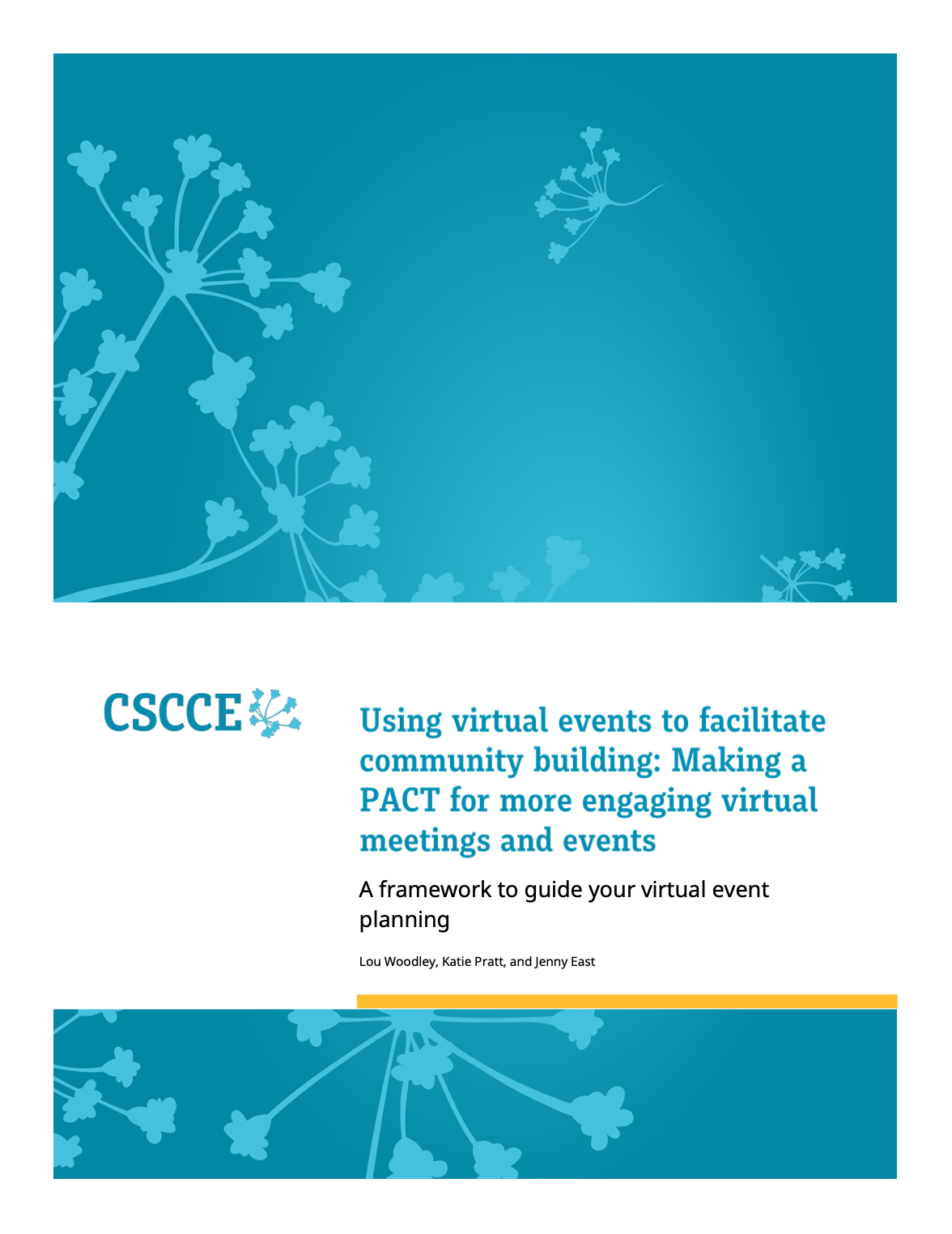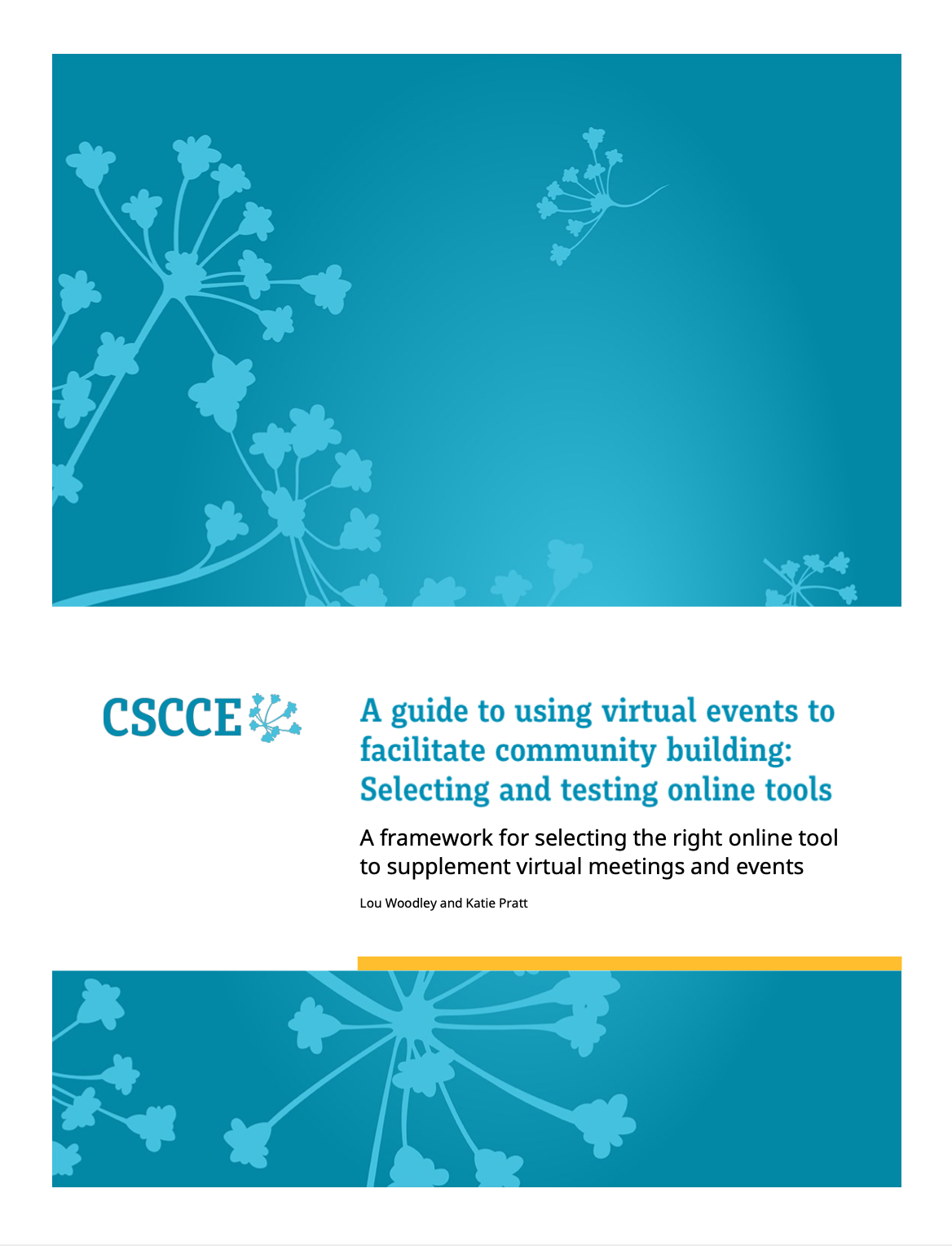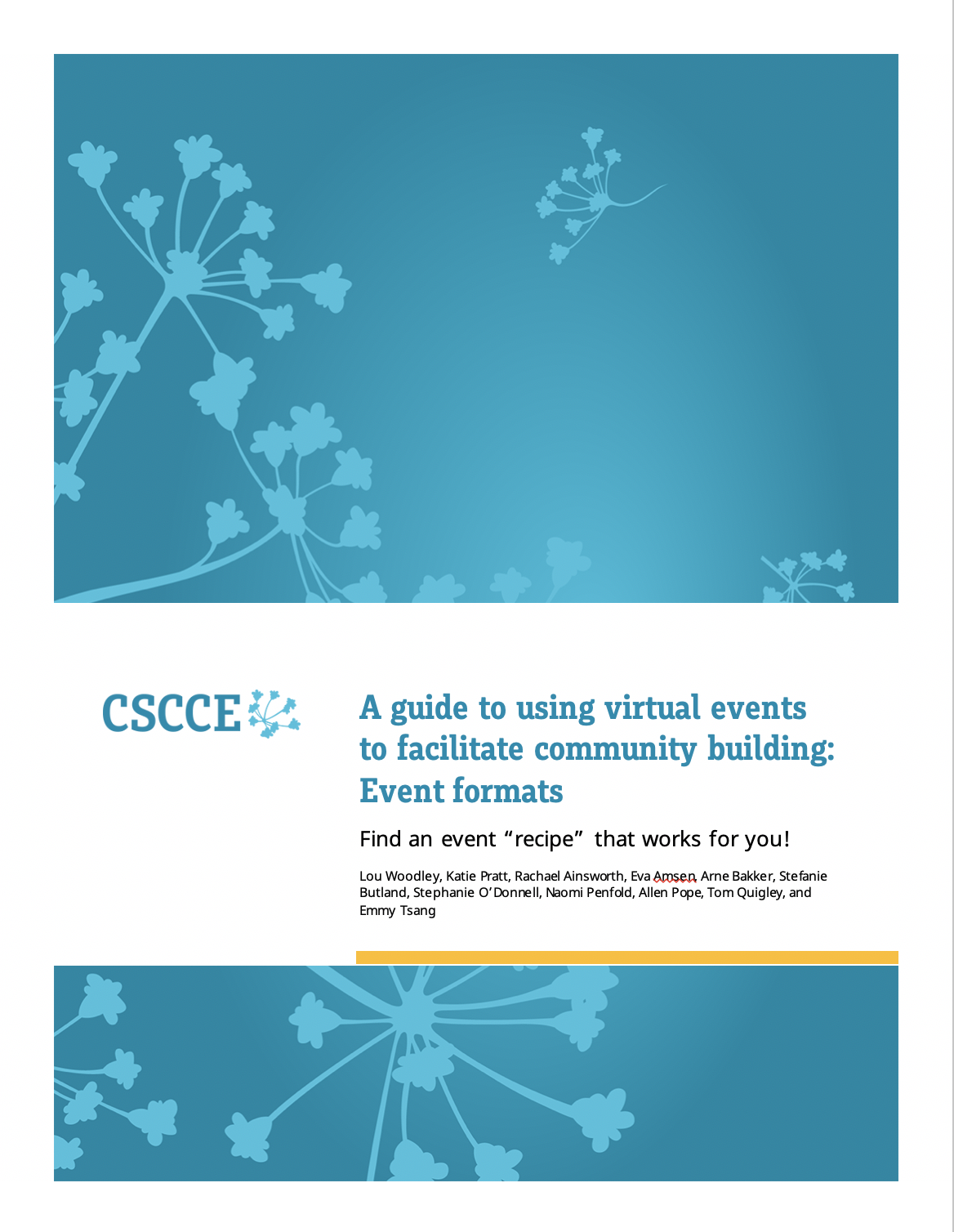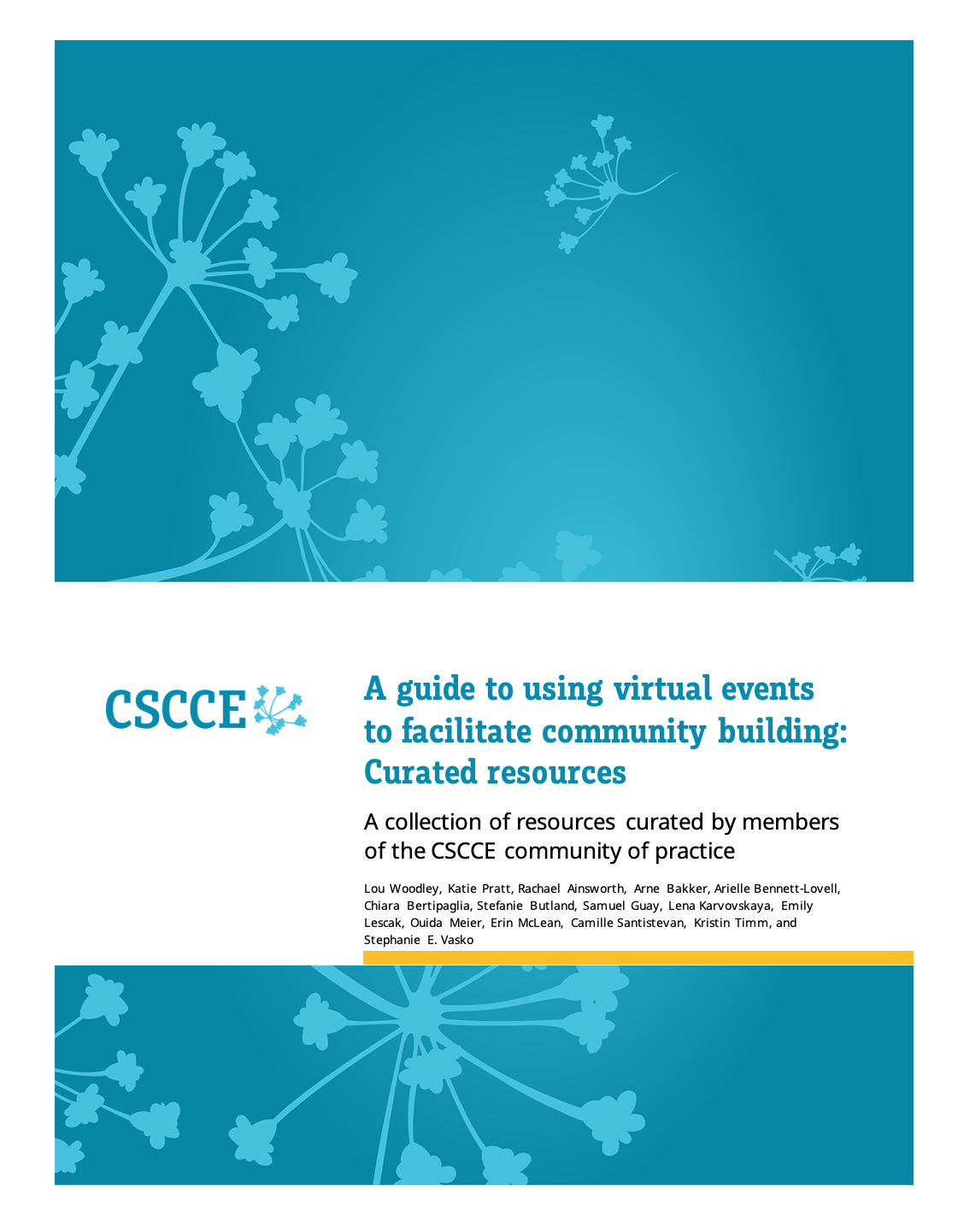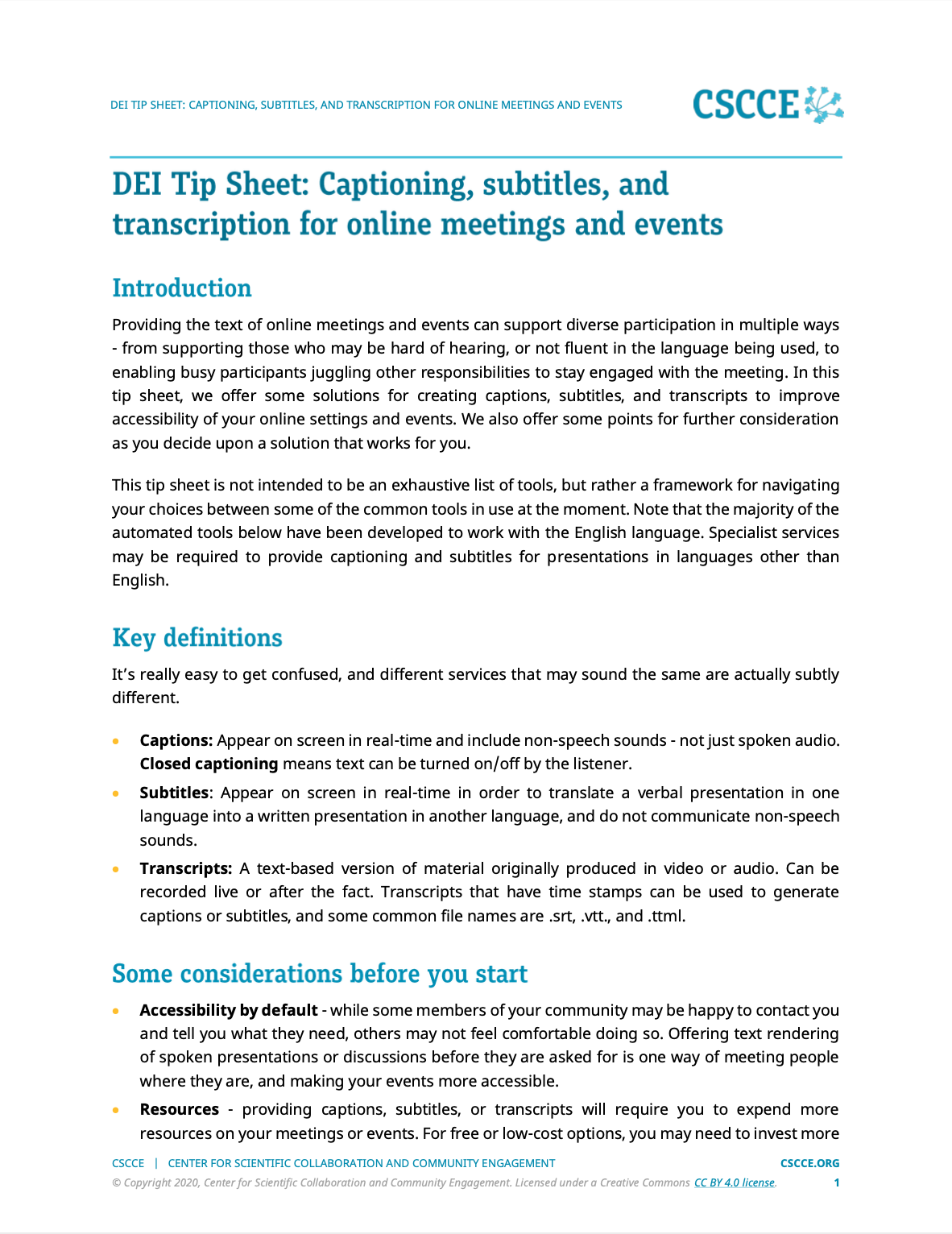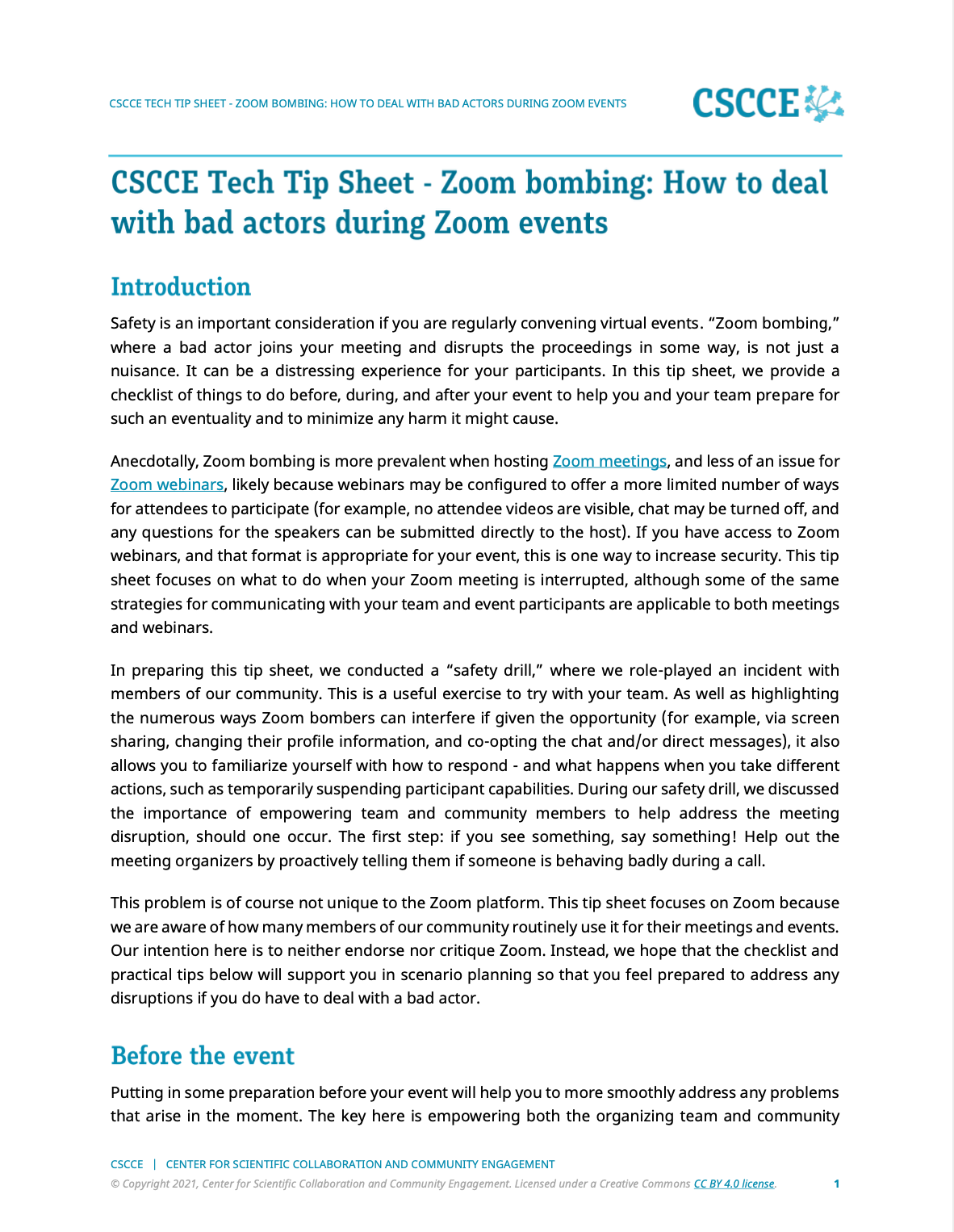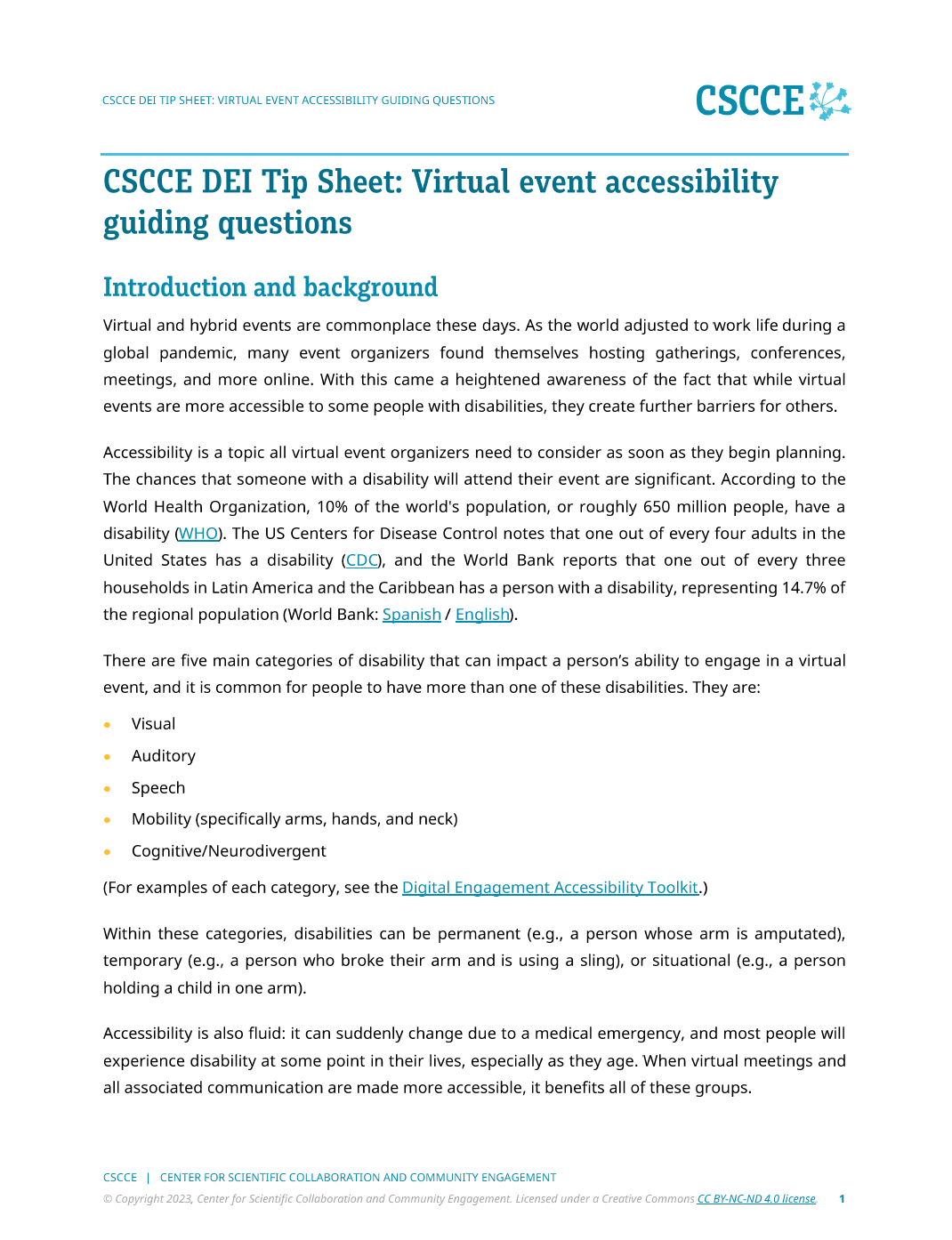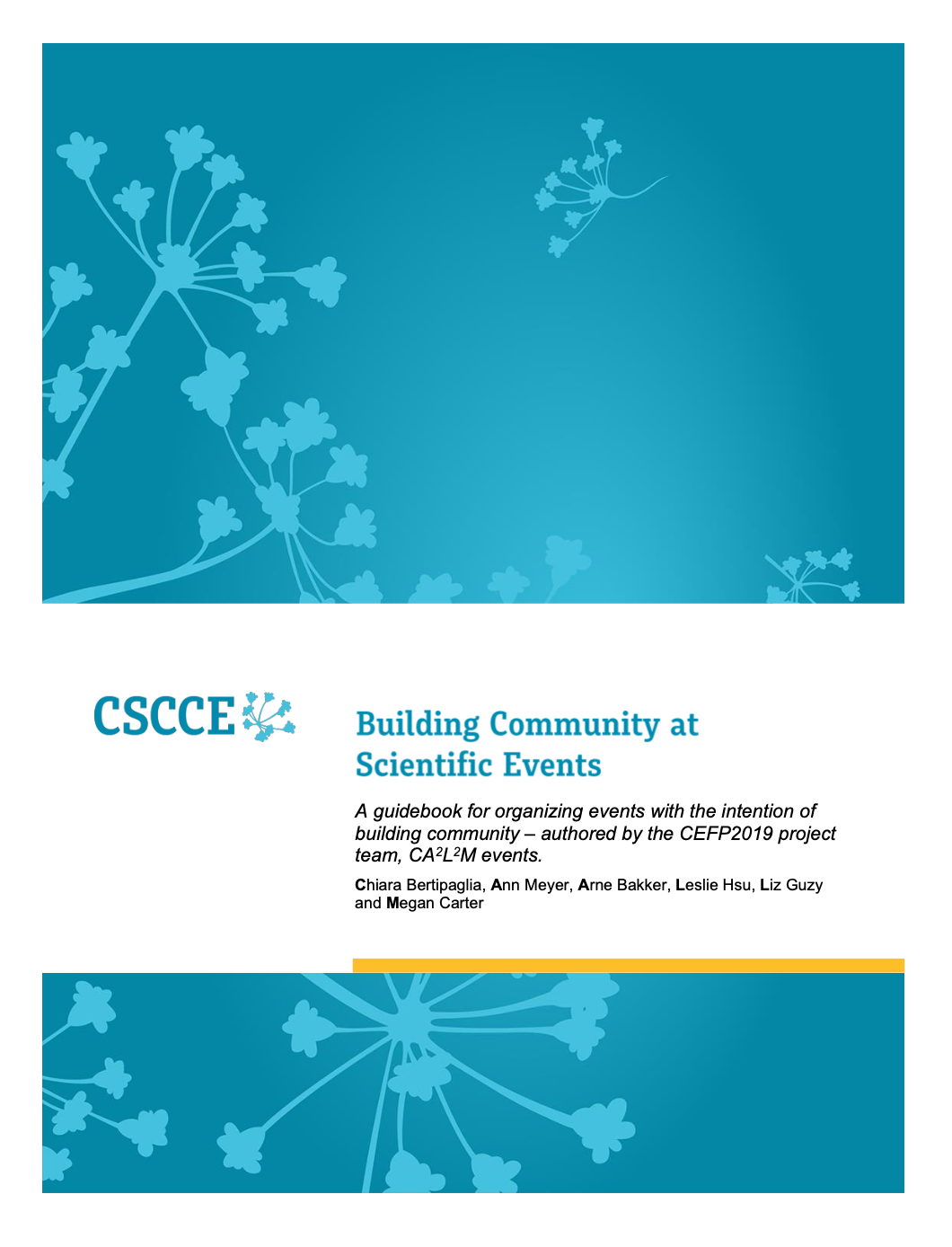Event programming is a feature of many communities – whether that’s a monthly community call or an annual conference. But how do you design events that are welcoming from the outset and that promote enjoyable, inclusive interactions between attendees?
Guidebook to virtual events
This guidebook – with four published sections to date – was co-created with members of the CSCCE community of practice. From the earliest planning stages, through deciding on an event format and what online tools to use, this guide will help you plan inclusive and engaging events that build community.
Using virtual events to facilitate community building: Making a PACT for more engaging virtual meetings and events
by Lou Woodley, Katie Pratt, and Jenny East
This section focuses on the overall event planning process: We outline our PACT framework, which describes four key elements to consider when planning your meeting or event.
Using virtual events to facilitate community building: Selecting and testing online tools
by Lou Woodley and Katie Pratt
This section outlines five steps to assist your assessment of virtual tools to supplement online meetings and events. We walk you through the process; defining the goals or use case first and then finding the right tool to meet your needs.
Using virtual events to facilitate community building: Event formats
by Lou Woodley, Katie Pratt, Rachael Ainsworth, Eva Amsen, Arne Bakker, Stefanie Butland, Stephanie O’Donnell, Naomi Penfold, Allen Pope, Tom Quigley, and Emmy Tsang
Co-created with members of our community of practice, this section includes 12 "recipes" for virtual events. In it, you’ll find protocols, tips, and lessons learned from STEM community managers in a variety of settings.
Using virtual events to facilitate community building: Curated resources
by Lou Woodley, Katie Pratt, Rachael Ainsworth, Arne Bakker, Arielle Bennett-Lovell, Chiara Bertipaglia, Stefanie Butland, Samuel Guay, Lena Karvovskaya, Emily Lescak, Ouida Meier, Erin McLean, Camille Santistevan, Kristin Timm, and Stephanie E. Vasko
In this section we focus on curating links to useful resources about virtual events – including case studies of conferences and trainings that moved online at short notice.
If you are organizing virtual events, you may also find our DEI Tip Sheets on captioning and accessibility, as well as our Tech Tip Sheet on how to deal with bad actors, a.k.a. Zoom bombers, useful as you prepare:
DEI Tip Sheet: Captioning, subtitles, and transcription for online meetings and events
by Katie Pratt, Camille Santistevan, Lou Woodley, Stefanie Butland, and Cassandra Gould van Praag
In this tip sheet, we offer some solutions for creating captions, subtitles, and transcripts to improve accessibility of your online settings and events.
CSCCE Tech Tip Sheet – Zoom bombing: How to deal with bad actors during Zoom events
by Katie Pratt and Lou Woodley
This tech tip sheet is intended to support you in scenario planning so that you feel well prepared to address any disruptions caused by a Zoom bomber. It includes a checklist of things to do before, during, and after your event.
DEI Tip Sheet: Virtual event accessibility guiding questions
by Rebecca Carpenter, Sara Kobilka, Katie Pratt, Maya Sanghvi, Casey Wright, Yanina Bellini Saibene, Hao Ye, and Lou Woodley
This tip sheet explores 12 guiding questions to help improve the accessibility of your next virtual event; from the very earliest planning stages, through communications and marketing, to event hosting, follow-up, and evaluation.
Guidebook to building community at scientific events
The CALM events project team of Arne Bakker, Chiara Bertipaglia, Megan Carter, Liz Guzy, Leslie Hsu, and Ann Meyer from the CEFP2019 cohort created a comprehensive guidebook to building community at events – including in-person events.
CALM events guidebook for building community through events
by Arne Bakker, Chiara Bertipaglia, Megan Carter, Elizabeth Guzy, Leslie Hsu and Ann Meyer
The CALM events guidebook is a comprehensive multi-chapter guide to planning and hosting events of different formats in order to build community.
Diversity, equity, and inclusion
Please visit our DEI resource page for additional tip sheets and blog posts to help you consider ways to make your meetings inclusive and accessible.
Blog posts
Event formats
- Six tips for running a successful unconference – From having a code of conduct to planning how to capture content from the event, CEFP2017 Fellow, Stefanie Butland, shares things to plan ahead of time for a successful unconference.
- Dinner parties and sandpits – intensive retreats to catalyze scientific collaborations – CEFP2017 Fellow, Jennifer Davison, outlines different formats for offsite events designed to promote team-building.
- Book Dashes: Collaborative community events – In this guest blog post, Arielle Bennett-Lovell (a 2019 CSCCE Community Engagement Fellow) reflects on the third Turing Way Book Dash event.
- Prioritizing Accessibility in Organizing Online Events – In this guest blog post, Serah Rono (CEFP2019 Fellow) and Emily Lescak share an accessibility checklist to guide you as you plan virtual events.
Icebreakers and welcomes
- Pre-event interviews – In How to prepare 40 new community members for an unconference CEFP2017 Fellow, Stefanie Butland outlines the pre-event preparations that she carried out to help new members of the community feel prepared and welcome.
- Breaking the ice well – CEFP Fellows Allen Pope, Amber Budden, and Stefanie Butland and mentor Aidan Budd discuss facilitating interpersonal community interactions in person. In part one they describe several icebreaker activities and in part two they describe how to bring your community along with you in what can sometimes be a nerve-wracking activity for a community manager!
- CSCCE Community Tools Trial 2.0 Recap: Virtual networking events – Our February 2021 Tools Trial involved designing a networking event that would work online and utilize a platform other than Zoom.
Event programming
- Leveraging anniversary programming and content to nurture community – CEFP2019 Fellow, Camille Santistevan, lists 5 top tips for event-planning around your organization’s anniversary events and 3 things to consider.
- Prioritizing Accessibility in Organizing Online Events – In this guest blog post, Serah Rono and Emily Lescak summarize Serah’s presentation and discussions from her Code for Science & Society community talk on accessibility in virtual events, and share an accessibility checklist to guide you as you plan virtual events.
Transitioning in-person events ONLINE
- Going Online: How we organized the first ever virtual csv,conf – In a three-part series of guest blog posts, Serah Rono, Lilly Winfree, Jo Barratt, Elaine Wong, Jess Hardwicke, John Chodacki, and Jonathan Cain reflect on the challenges and opportunities of moving an international conference online.
Virtual tools trials
Our virtual tools trials bring together interested members of our community of practice to try out platforms that might be useful for convening communities online. Our tools trials are ongoing, so if you have a platform you’re interested in trying, or would like to co-host a trial and share your experience, please let us know by emailing info@cscce.org.
After each trial, we share a recap of our findings on our blog, each of which includes a link back to the full collaborative notes document from the trial. Find out more about:
- QiqoChat – a tool for online conferences
- Mural/Padlet/Jamboard – tools for brainstorming and ideation
- Gather – a conferencing and networking platform
- Etherpad+Video – a tool for collaborative writing with in-doc video chat
- Remo – a conferencing and networking platform
- Wonder – a lightweight, spatially-controlled, networking platform
- Butter – a video-conference tool with additional functionality such as integration with other online tools and enhanced facilitation capability
- Discourse – an open-source community discussion platform that can be tailored to meet the needs of a range of communities
Community calls
i) Planning and evaluating accessible online events
In July 2020’s CSCCE community call we discussed “Planning and evaluating accessible online events” with three speakers from the CSCCE community of practice. You can watch the call archive below.
Speakers AND THEIR SLIDES
- “It’s Dangerous To Go Alone, Take This – Non-Player Characters & Prepping For Your Virtual Event” – Tom Quigley, ConservationXLabs (slides)
- “It’s All About Access: Planning Meetings for Wider Audiences” – Rebecca Carpenter, Deaf and Hard of Hearing Virtual Academic Community (slides)
- “Evaluating Virtual Events” – Emily Lescak, Code for Science and Society (slides)
Summary and resourceS
Check out the blog post recap of the call – including additional resources recommended by attendees.
ii) What we’ve learned from a year of virtual events
On our March 2021 Community Call, we hosted a series of thematic breakout rooms to share our knowledge after a year of hosting and attending virtual events. We also considered how to design engaging hybrid events.
Breakout themes and discussion moderators
- Meetings from the participant’s perspective – Amber Budden, NCEAS
- Hybrid meetings and events – Emily Lescak, Code for Science and Society
- General event planning – Chiara Bertipaglia, Columbia University’s Zuckerman Institute
- Surviving the day of the event- Megan Carter, ESIP
Summary and resources
Our blog post recap summarizes the discussion had in all four rooms, offering a great jumping off point for anyone organizing a virtual or hybrid event.
